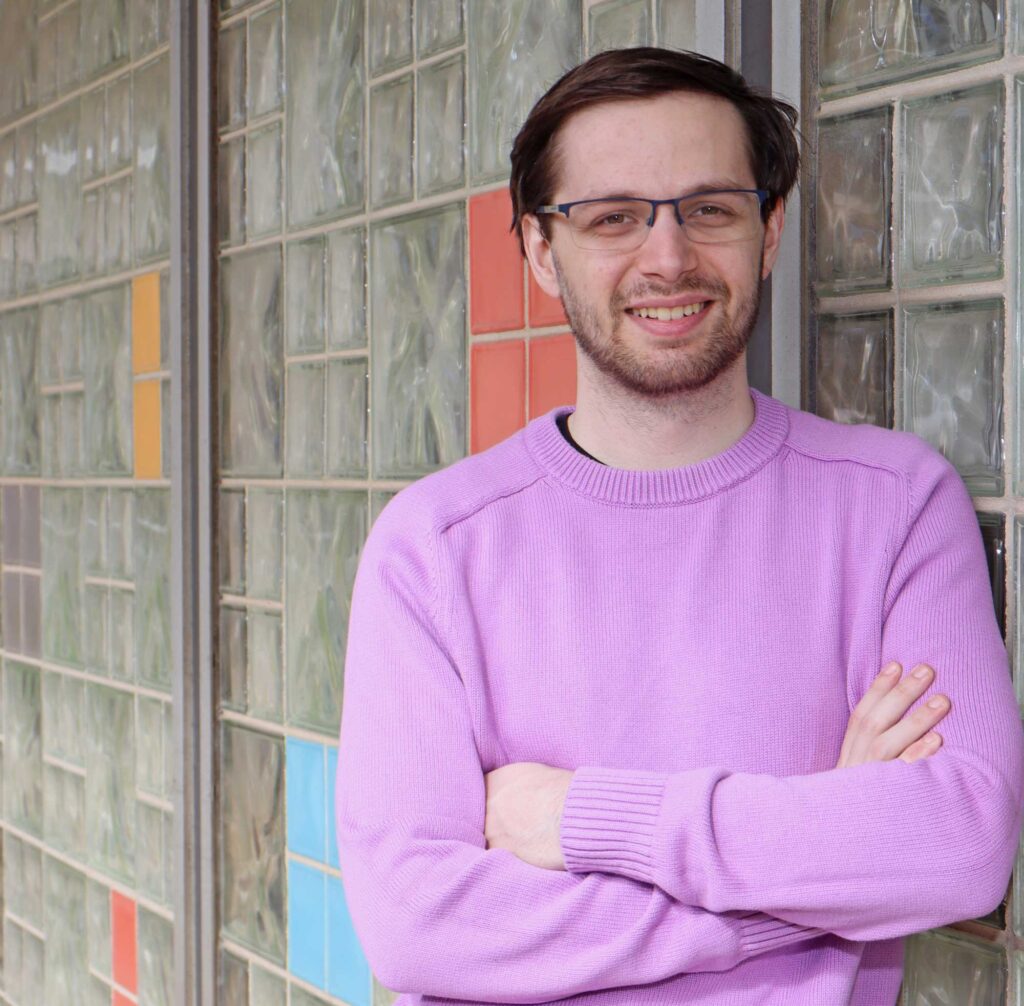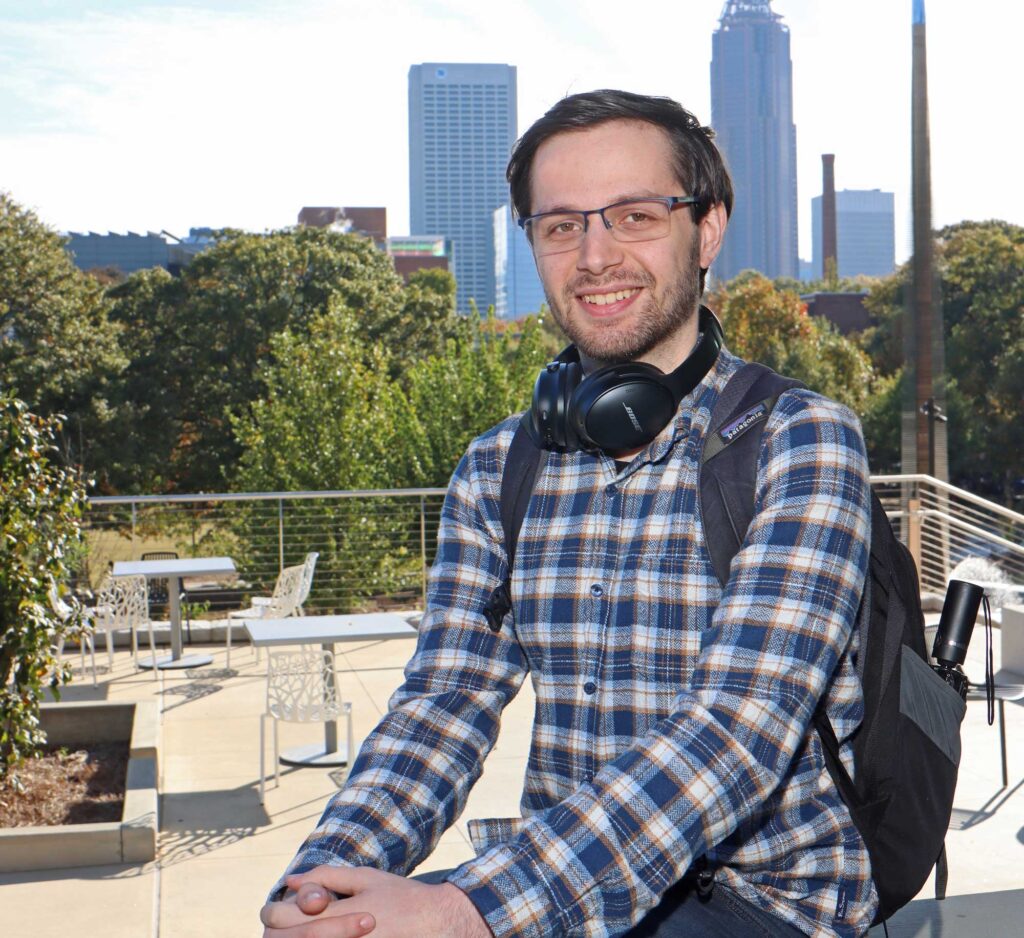Nate
Nate’s story appears in the 2023 issue of Journeys Magazine.
Nate’s Story: A Journey of Self-Discovery and Renewal
“My experience at Skyland Trail presented me with a variety of challenging emotions and revelations to process which allowed me to better understand myself and regain control over my life.”
In the realm of mental health, the journey from hopelessness to healing often is marked by personal revelations, self-discovery, and embracing newfound skills. Nate is a Ph.D. candidate in mechanical engineering at Georgia Tech who graduated from the Skyland Trail adult program in 2022.

In 2018, Nate was selected as a Clark Scholar and enrolled in the undergraduate engineering program at Georgia Tech. As a Clark Scholar, he became part of a national scholarship and leadership development program designed to help build a pipeline of future engineers.
Nate was ultra-focused on his academic goals and plans for the future. Having experienced anxiety for many years, Nate began suffering from crippling panic attacks. The attacks, and fear of the next one, began to affect his ability to participate in school, hobbies, or social relationships. He recognized that he needed help beyond what he was likely to find on his college campus.
After learning about Skyland Trail from a family friend, he admitted to the adult day treatment program.
A Supportive Community
Skyland Trail became his route to transformation, offering a supportive community of professional experts and peers.
“It felt good to be a part of a community of people struggling with issues that were similar to my own,” says Nate. “There seems to be a general attitude on Skyland’s campus that most active participants want to feel better, and I believe that this is a product of the comfortable environment and friendly professionals.”
A More Accurate Diagnosis
With the help of his treatment team, Nate realized that his struggle extended beyond his intense anxiety, and he gradually unearthed the profound impact of a depression diagnosis.
“At first, I believed my struggle to be vested purely in my most crippling condition: intense anxiety,” says Nate. “As my panic disorder symptoms improved, my medication became stable, and I learned some basic anxiety management skills, I had the revelation that my mindset was heavily impacted by depression.”
Recognizing the impact of depression helped Nate view some of his challenges in a new light. And over time, he was able to open himself up to new strategies for dealing with them.
Discovering His Voice
Enrolled in the Cognitive Behavioral Therapy (CBT) program at Skyland, Nate found solace within his core group, where a consistent group of his peers in treatment shared and processed challenges with support from Skyland Trail experts. Narrating his story became a landmark moment.
“On top of overcoming my instinct to keep things bottled up, I found that the process of exploring my past and trying to form a narrative gave me insight into moments that had a significant impact on creating negative core beliefs,” says Nate. “I also found that understanding the breadth of my experiences helped me conclude that my life had meaning beyond my work performance and academic performance.”
A Toolbox of Skills
Nate also gained a toolbox of skills to help him manage his anxiety and depression. “Through my time at Skyland, I learned skills that helped me manage my tolerance for anxious symptoms and that helped me manage negative thoughts that played into the more challenging parts of both diagnoses,” he says.
A new understanding of mindfulness and self-care added tools to Nate’s new toolbox.

“Skyland’s holistic approach gave me a head start on good habits of things I can do every day to help improve the baseline of how I feel,” says Nate. “Mindfulness is thrown out as a buzzword so often that I never really took what being mindful means to heart. I find that emphasizing mindfulness has improved my ability to work and perform my hobbies well.”
“And self-care is a game of balance to me,” continues Nate. “I find that it is helpful to such an extent that I sometimes have to be mindful that I need to put my head down and attend to tasks that I may be procrastinating.”
A Student Mental Health Knowledge Gap
After three months in the day treatment program, Nate returned to Georgia Tech. After applying his new skills and perspectives to his own college experience, Nate began to reflect on the experiences of others. He had a heightened awareness of the mental health challenges faced by college-aged individuals and the many barriers to seeking and accessing care.
While Nate recognizes that these challenges are multifaceted, he believes a knowledge gap may contribute to students not seeking care, even when mental health services are available on campus. Many young adults have only seen mental health care portrayed in the media as acute hospital care – which can seem scary – as opposed to voluntary treatment programs like Skyland Trail that can feel more like a college campus.
“I’m a bit biased, but I believe that the biggest roadblocks are knowledge-based,” Nate says. His perspective reveals a need for increased awareness about the spectrum of mental health care options available as well as the importance of recognizing when to seek professional help.
“Knowledge that not every mental health issue can be addressed with grit and distraction is critical,” says Nate. “I used to rely on being buried in work to feel well – the stress of coursework was a welcome distraction from the stress my mental health had imposed on me.”
Engineering a Solution: Sharing Skyland Trail Expertise with Students
Nate took concrete steps to address that knowledge gap for his peers in the Georgia Tech Clark Scholars Program. Nate developed a proposal to include mental health education led by Skyland Trail in the Clark Scholars Program curriculum. Skyland Trail experts provided group education sessions focused on a range of topics, including identity and insight, grief and loss, self-esteem, and more. These sessions, designed to provide foundational knowledge and encourage open dialogue, fostered an environment where participants felt safe discussing their mental health experiences.
“The feedback we received from students was incredibly positive. Many participants noted a reduction in stigma around mental health conversations, and some even sought out mental health services after the sessions,” Nate observed.
Building on the success of the initial series with Nate and his cohort, the collaboration is continuing with 2023 Clark Scholars.
A Healthy Path Forward
Today, Nate is pursuing a Ph.D. in mechanical engineering. He is conducting research in ultrasonic nondestructive evaluation for the prediction of remaining life for in-service mechanisms that are exposed to extreme loading conditions.
While he continues to employ the skills he learned at Skyland Trail to stay well, he recognizes the ongoing challenges of building community, especially in the world of transient college students. “I still have room for improvement with putting myself in social situations and with meeting new people,” says Nate.
When he completes his Ph.D. program, Nate envisions a future working with university students, applying his engineering skills to improve feedback and course evaluation methodologies to promote mental wellness without sacrificing mental health. His story stands as a testament to the transformative power of mental health care, emphasizing the importance of self-discovery, community support, and the pursuit of a meaningful life beyond the confines of stigma.
Advice for Peers
Nate’s advice to others grappling with mental health challenges is straightforward – reach out and be screened. He advocates for voicing concerns to professionals who can provide a starting point for the journey towards wellness.
“It never hurts to call and be screened. You owe it to yourself to voice your concerns to a professional who can, at the very least, give you a place to start. Getting off the starting block is what’s most important.”
